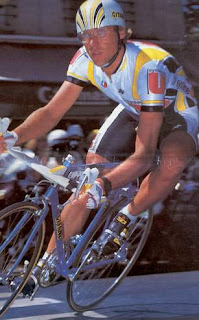– Ah, I know who you are, you’re the man who lost the Tour de France by 8 seconds!
– No, I’m the man who won two Tours
So begins the biography about Laurent Fignon. Best known for losing the epic battle with Greg LeMond during July 1989, Fignon won the Tour de France in 1983. Some said this was only because Hinault had a knee injury. So Fignon repeated his win in 1984. For me these things helps define Fignon, he often had a point to prove and attacking riding often seemed to be about teaching his critics a lesson. Now sports writer William Fotheringham is translating the biography into English.
The publication in France was a big event for several reasons. First, the book was launched in June, weeks before the Tour de France and Fignon announced he had been diagnosed with cancer.
Regrettably (but predictably) sections of the French media latched onto the chapters about doping and whether any substances he took 25 years ago were responsible for his illness today. In medical terms such a link is tenuous but the tiny probability became the big talking point of radio phone-ins and gossip magazines. There are cancer risks from doping but the media isn’t going to handle issues of incidence and probability, cause and correlation with any sensitivity.
Enough on the brief polemic which masked a good book. Fignon tells how he was robbed of the 1984 Giro d’Italia (at one point a TV helicopter used its downdraft to give him a headwind during a crucial TT stage, it was then sent to propel Francesco Moser towards the wind). The Giro-Tour double came close in 1989, for an imperial Fignon had won in Italy, taking the maglia rosa for the final week.
Regular readers of this blog might know I have a thing for the 1980s and this book is full of insights. Fignon was at the heart of cycling’s transformation into a modern sport, alongside innovators Bernard Tapie, Cyrille Guimard and LeMond. The English version should be worth waiting for.

